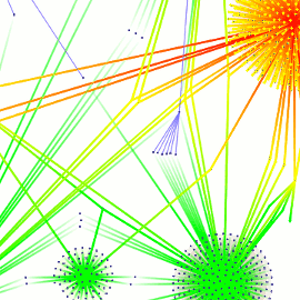Social Network Structure of Network Neutrality
Abstract
The concurrent arrival of the network neutrality debate in both the United States and Canada raises doubts about their separate national character, and suspicions about the influence of transnational economic interests, and suggests lessons about the political ramifications of economic integration. While a great deal has been written both in favour and against network neutrality policies, substantially less work has been done to interrogate the social networks of the many vested interests in the policy discussion. This paper draws on the interlocking directorate tradition of Social Network Analysis to investigate the political economy of network neutrality. By conducting a qualitative experiment using social network graphing software to test three plausible hypotheses it investigates the social relations of interests vested in the outcome of this contentious telecommunications policy.
Introduction
“Net neutrality means simply that all like Internet content must be treated alike and move at the same speed over the network. The owners of the Internet’s wires cannot discriminate. This is the simple but brilliant ‘end-to-end’ design of the Internet that has made it such a powerful force for economic and social good: All of the intelligence and control is held by producers and users, not the networks that connect them.” –– Lawrence Lessig & Robert McChesney (2006)
While the later decades of the 20th century in North America were marked by widespread economic deregulation and the proliferation of digital communication networks (i.e. the internet), the first decade of the 21st century produced a public battle over how to regulate the digital network infrastructure and, consequently, the content they deliver. Broadly described in North America as “network neutrality” and “open access”, the regulatory policies in contention will likely shape the political economy of communication in the centre of the world system for the foreseeable future. The concurrent arrival of this debate in both the United States and Canada raises doubts about their separate national character, and suspicions about the influence of transnational economic interests, and suggests lessons about the political ramifications of economic integration.
There has been a great deal written about network neutrality since AT&T Corp v. City of Portland (2000) and Brand X v. FCC (2003, 2005), such that the International Journal of Communication had a special issue on the topic in 2007. However, a review of the literature suggests that the vast majority of scholarship has revolved around the question of whether or not network neutrality is “good” and very little (if any) work has been done to interrogate the social networks of the many vested interests in the policy discussion. Leaving aside the question of whether network neutrality should be national policy, this paper draws on the interlocking directorate tradition of Social Network Analysis (Fennema & Schijf, 1978) to investigate the political economy of this telecommunication policy debate. The first part of this paper first discuses two theoretical approaches to network neutrality – Harold Innis’ bias of communications and Dan Schiller’s demand side political economy – and samples news reports which suggest the transnational character of policy negotiation. The second part describes a qualitative experiment using social network graphing software which investigates three plausible hypotheses about the social relations of interests vested in the outcome of network neutrality policy.
